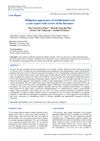 21 citations,
February 2021 in “Frontiers in Endocrinology”
21 citations,
February 2021 in “Frontiers in Endocrinology” Hormones affect prostate health and disease, with certain hormone imbalances linked to prostate cancer and benign prostatic hyperplasia.
September 2022 in “Dermatology and therapy” Androgenetic alopecia is linked to heart disease, metabolic issues, and mental health problems.
10 citations,
March 2003 in “Journal of cutaneous medicine and surgery” Alopecia mucinosa can be treated successfully with minocycline.
[object Object]  1 citations,
December 2023 in “Indian Dermatology Online Journal”
1 citations,
December 2023 in “Indian Dermatology Online Journal” Steatocystoma multiplex causes recurring skin cysts and needs early recognition for better management.
 3 citations,
June 2021 in “Clinical, Cosmetic and Investigational Dermatology”
3 citations,
June 2021 in “Clinical, Cosmetic and Investigational Dermatology” Dermoscopy is an effective tool for accurately detecting skin cancers.
234 citations,
November 2009 in “American journal of human genetics” Common variants in the Trichohyalin gene are linked to straight hair in Europeans.
 1 citations,
May 2023 in “European Journal of Human Genetics”
1 citations,
May 2023 in “European Journal of Human Genetics” Rare ULBP3 gene changes may raise the risk of Alopecia areata, a certain FAS gene deletion could cause a dysfunctional protein in an immune disorder, and having one copy of a specific genetic deletion is okay, but two copies cause sickle cell disease.
1 citations,
May 2017 in “InTech eBooks” The chapter explains common scalp conditions, including infections, infestations, and tumors.
39 citations,
October 2012 in “Familial cancer” New therapies for Birt–Hogg–Dubé syndrome are being developed based on understanding the FLCN gene's role.
 24 citations,
July 2016 in “Revue Neurologique”
24 citations,
July 2016 in “Revue Neurologique” Gilles de la Tourette syndrome is treatable, with behavioral therapy as a recommended first option and other treatments available for more severe cases.
 November 2023 in “International surgery journal”
November 2023 in “International surgery journal” A man's neck lump was a trichilemmal cyst, not cancer, and should be fully removed due to rare risk of becoming malignant.
 50 citations,
March 2001 in “Clinics in Dermatology”
50 citations,
March 2001 in “Clinics in Dermatology” Genes and hormones cause hair loss, with four genes contributing equally.
 49 citations,
January 2004 in “Dermatology”
49 citations,
January 2004 in “Dermatology” Men with a family history of hair loss are more likely to experience it themselves, especially if both parents have hair loss.
 6 citations,
May 1993 in “Archives of Disease in Childhood”
6 citations,
May 1993 in “Archives of Disease in Childhood” Children's hair loss can be caused by many factors, including autoimmune diseases, emotional stress, genetics, and infections, with treatment and prognosis varying.
 370 citations,
September 1999 in “The New England Journal of Medicine”
370 citations,
September 1999 in “The New England Journal of Medicine” Finasteride and minoxidil are effective for hair loss, but continued research is needed for better treatments.
[object Object]  197 citations,
June 2009 in “American journal of human genetics”
197 citations,
June 2009 in “American journal of human genetics” WNT10A mutations often cause ectodermal dysplasias, with males showing more tooth issues than females.
 143 citations,
October 1996 in “Dermatologic Clinics”
143 citations,
October 1996 in “Dermatologic Clinics” Too much androgen can cause hair loss; finasteride may help.
 59 citations,
February 2021 in “BMJ”
59 citations,
February 2021 in “BMJ” High doses of cyproterone acetate increase the risk of brain tumors in women, but the risk decreases after stopping the medication.
 47 citations,
June 2011 in “Movement Disorders”
47 citations,
June 2011 in “Movement Disorders” The LRRK2-G2019S mutation in Parkinson's disease has a lifetime penetrance of 25-35%, and finasteride may help reduce symptoms in adult male Tourette syndrome patients.
 46 citations,
September 2011 in “Movement Disorders”
46 citations,
September 2011 in “Movement Disorders” Finasteride reduces Tourette syndrome symptoms, but results may be limited due to potential biases.
 40 citations,
April 2018 in “Endocrine”
40 citations,
April 2018 in “Endocrine” PFS and PSSD are similar conditions with persistent sexual dysfunction after stopping medication.
 39 citations,
May 2011 in “Movement Disorders”
39 citations,
May 2011 in “Movement Disorders” Finasteride may help reduce symptoms in male Tourette syndrome patients.
 38 citations,
August 2005 in “Veterinary dermatology”
38 citations,
August 2005 in “Veterinary dermatology” A disease causing skin issues in young adult German short-haired pointers is hereditary, with most affected dogs not responding to treatment.
 36 citations,
October 1996 in “Dermatologic Clinics”
36 citations,
October 1996 in “Dermatologic Clinics” Mice are useful for researching human hair loss and testing treatments, despite some differences between species.
 25 citations,
March 2012 in “Journal of Dermatological Science”
25 citations,
March 2012 in “Journal of Dermatological Science” Genetic variants linked to ten skin diseases were found, showing both immune and non-immune factors play a role.
 18 citations,
June 1995 in “International Journal of Dermatology”
18 citations,
June 1995 in “International Journal of Dermatology” Women experience various skin issues at different life stages, requiring careful treatment and awareness.
 17 citations,
May 2011 in “Movement Disorders”
17 citations,
May 2011 in “Movement Disorders” Finasteride significantly reduced tics and obsessive-compulsive symptoms in patients with Tourette syndrome.
 13 citations,
June 1989 in “Pediatric clinics of North America/The Pediatric clinics of North America”
13 citations,
June 1989 in “Pediatric clinics of North America/The Pediatric clinics of North America” The conclusion is that young women with excessive hair growth should be quickly tested for hormonal issues and treated to improve their social well-being.
 10 citations,
June 2011 in “Movement Disorders”
10 citations,
June 2011 in “Movement Disorders” THAP1 gene changes do not affect DYT1 dystonia; finasteride may help reduce tics and OCD in Tourette syndrome.
 10 citations,
March 2007 in “Skinmed”
10 citations,
March 2007 in “Skinmed” The conclusion is that in the Indian subcontinent, socioeconomic status, stress, and family structure affect the severity of alopecia areata, and its psychological impact is generally mild or moderate.

























